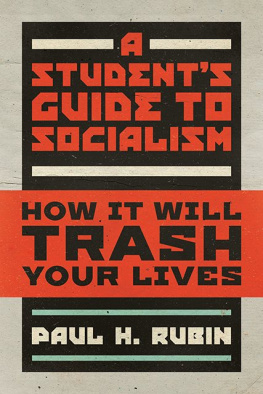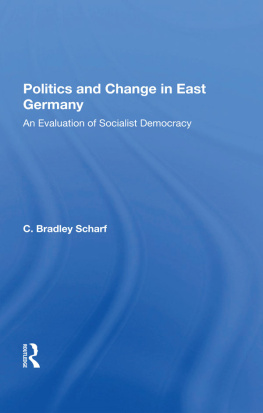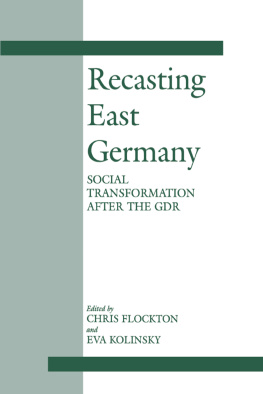Synthetic Socialism
2008 The University of North Carolina Press
All rights reserved
Designed by Courtney Leigh Baker
Set in Scala and The Sans by Keystone Typesetting, Inc.
Manufactured in the United States of America
The paper in this book meets the guidelines for permanence and durability of the Committee on Production Guidelines for Book Longevity of the Council on Library Resources.
The University of North Carolina Press has been a member of the Green Press Initiative since 2003.
Library of Congress Cataloging-in-Publication Data
Rubin, Eli.
Synthetic socialism : plastics and dictatorship in the German Democratic Republic / by Eli Rubin. 1st ed.
p. cm.
Includes bibliographical references and index.
ISBN 978-0-8078-3238-7 (cloth: alk. paper)
1. Consumption (Economics)Germany (East) 2. Consumer behaviorGermany (East) 3. Plastics industry and tradeGermany (East). 4. Socialism and society. I. Title.
HC290.795.C6R83 2009
338.4766840943109045dc22
2008027371
CLOTH 12 11 10 09 08 5 4 3 2 1
TO KATIE, BETSY, AND MY PARENTS
Contents
Illustrations
Plastic chicken soft-boiled egg holder
Meladur (melamine) imitation wood plate
Intecta furniture from Hellerau
Sprelacart-surfaced wardrobe
Plastic table with modern and cultured accoutrements
Ratiokche on display for the public
Images of Erziehung
Explanatory cartoon from the comic book Mosaik
Ads for Leunawerke plastics
Ads for linens and curtains made from synthetic fibers
Cover of Kultur im Heim, 1961
Childs room model named Dorle
Cover of Guter Rat, January 1966
Household plastics in pastel tones
Beach scene with all-plastic products
Tables
1.1 Original estimates for increases in production for the Chemistry Program
1.2 Projected production figures for three major plastics under the Chemistry Program
2.1 Results of DBA survey on sleeping furniture preferences
5.1 Numbers of household kitchen items to be replaced with plastics
5.2 PLS plan for total replacement of steel with plastic in four leading metallurgical industries
5.3 PLS plan for leading plastic types
5.4 Imports of plastic-processing machinery, 196470
5.5 Plan for increasing raw plastics, 196470
5.6 Planned increases in specific items from polystyrene
5.7 Planned increases for consumer items from polyethylene, 196570
5.8 Planned increases for product groups from Meladur (melamine), 196570
5.9 Planned increases for plastic starting products for consumer goods, 196770
5.10 Planned overall use of plastics in the third Five Year Plan, 197075
Acknowledgments
Many thanks, in no particular order, to Benita Blessing for her moral support; Silvia Rckert for providing the original work that inspired this book; Andreas Ludwig of the Dokumentationszentrum Alltagskultur der DDR in Eisenhttenstadt for all his patience and help; Marion (Buddy) Gray, Judy Stone, Catherine Julien, Nora Faires, Robert Berkhofer, Edwin Martini, Lynne Heasley, Sarah Hill, and all of my wonderful colleagues at Western Michigan University; Konrad Jarausch for his crucial and ongoing support; Chuck Grench, Katy OBrien, Tema Larter, Heidi Perov, David Perry, and everyone at UNC Press for their guidance and professionalism; Richard Wetzell, David Lazar, and Christoph Mauch of the German Historical Institute, and especially the late Gerald Feldman and the Friends of the German Historical Institute and Dr. Fritz Stern; Ed Ross Dickinson, Doris Bergen, and Kies Gispin of the Fritz Stern Dissertation Award Prize Committee of the GHI; Ray Stokes and Rainer Karlsch; the staff at the Bundesarchiv in Lichterfeld and Hoppegarten; Achim Kunze, Elke Beilfu, and Siegfried Gronert at the Michel archive at the Bauhaus Universitt Weimar; all those who provided me with tips, advice, and encouragement along the way, including Ina Merkel, Ralph Jessen, Thomas Lindenberger, Klaus Groe Kracht, Marc Silberman, Eric Schatzberg, Laird Boswell, Lewis Siegelbaum and Leslie Page-Moch, Greg Engels, Paul Betts, Katherine Pence, Jonathan Zatlin, Albrecht Wiesner, Justinian Jampol, Elizabeth Otto, Pieter Judson, Andr Steiner, David Sorkin, Jennifer Jenkins, and everyone I have left out; and above all, Karin Goihl of the Berlin Program for Advanced German and European Studies and my dissertation advisor, Rudy Koshar, at the University of Wisconsin-Madison for their faith in me.
Abbreviations and Acronyms
ABSacrylnitrite-butadiene-styreneAgfaAktiengesellschaft fr AnilinfabrikationAiFOffice for Industrial Design (Amt fr industrielle Formgestaltung)BASFBadische Anilin- und SodafabrikCIAMInternational Congress of Modernist ArchitectsCOMECONCouncil for Mutual Economic AssistanceDAMWGerman Office for Measurements and Goods Testing (Deutsches Amt fr Messewesen und Warenprfung)DBAGerman Architectural Academy (Deutsche Bauakademie)DIADeutsche Innen- und Auenhandelsgesellschaft [East German export and import organ]FRGFederal Republic of GermanyGDRGerman Democratic RepublicHO
Handelsorganisation, or trade organizationHPPEhigh-pressure polyethyleneKPDGerman Communist Party (Kommunistische Partei Deutschlands)MMWMinistry for Material Economy (Ministerium fr Materialwirtschaft)NSNew Economic System (Neue konomische System)NSPLPlanning and Leadership of the Peoples Economy (Neue konomische System der Planung und Leitung)NSDAPNational Socialist German Workers Party (Nationalsozialistiche Deutsche Arbeiterpartei)PLSPlastics Steering Office (Plastlenkstelle)SCKState Chemistry Office (Staatliches Chemiekontor)SEDSocialist Unity Party (Sozialistische Einheitspartei Deutschlands)StasiMinistry of State SecurityVbKDFederation of Visual Artists of the GDR (Verband bildender Knstler der DDR)VEBsindividual factoriesVVBsindustrial organizations (Vereinigung Volkseigenebetriebe, or Union of Peoples Own Factories)ZWKHWCentral Goods OfficeHousehold Goods (Zentrales Warenkontor fr Haushaltswaren)
Synthetic Socialism
Introduction
Plastic eggcups in the shape of chickens were once ubiquitous in East German households. They have become popular once again, in museum shops, on websites, at flea markets, and in shops devoted to the material culture of the bygone German Democratic Republic (GDR). They are part of an odd phenomenon known as Ostalgie, a resurgence of interest in the culture of the GDR in recent years in Germany and elsewhere. The prominence of plastic items from East Germany within this phenomenonfrom eggcup chickens to t-shirts bearing the slogan of a large East German chemical factory, Plastic and Elastic from Schkopauis an indication that plastic was an important part of East German culture and history. Still, there is something uncanny about the strange persistence of something we normally consider so disposable, so mundane. Like an empty plastic milk jug that washes ashore, East German plastic is a remarkable example of the refusal of East Germany to biodegrade, and of its haunting of post-unification Germany, especially in the guise of its material culture.
This book is about East German plastic, and I examine East German plastic from a number of angles: in terms of the high-level political and economic decision makers in control of the Communist planned economy who oversaw the mass production of plastic in the GDR; in terms of the industrial designer who gave aesthetic form and aesthetic meaning to plastic objects in the GDR, and thus the homes, offices, and other scenes of everyday life where East German plastic became ubiquitous; in terms of the advertising, advice, science fiction, and propaganda literature and media that accompanied the arrival of plastic in the lives of East Germans; and in terms of the experiences and opinions of ordinary East Germans themselves, in both their praise and their condemnation.










